Officially launched in china for almost two weeks, Xiaomi 13 already has many competitors. Looking at its specifications, this xiaomi 13 might be ranked one of the best smartphones of the year 2022. That notwithstanding, will it be better than the Nothing Phone 1? By studying these two phones from a closer perspective on different aspects, we will try to determine which one of them is the best and try to give you an idea on which one to choose.
| Nothing Phone (1) 8 Go + 128 Go | Xiaomi 13 8GB+256GB | |
 | 469,00€ | 889,50€ |
Design and conception
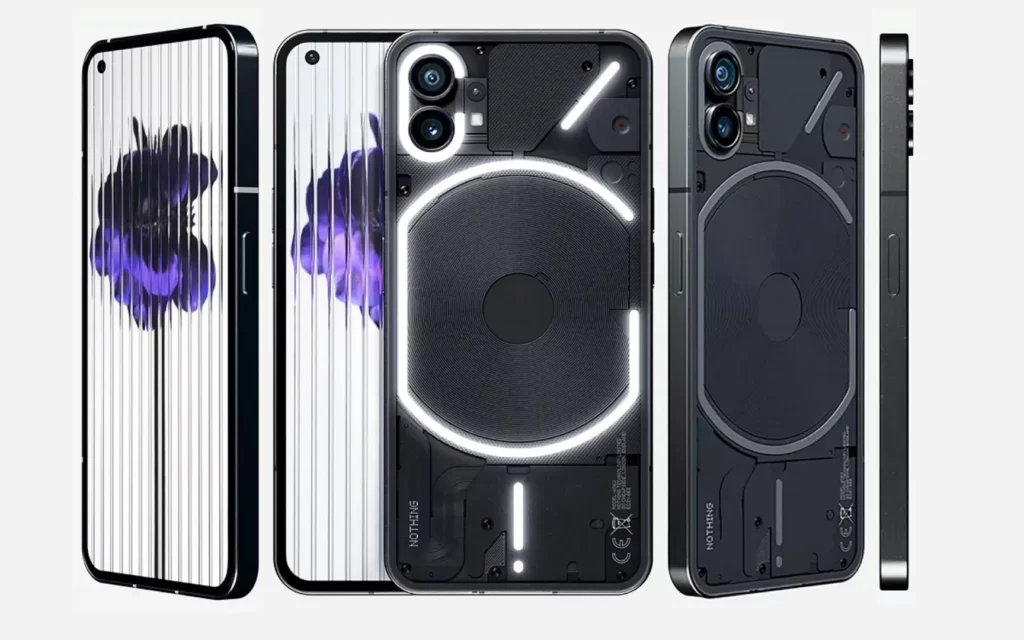
The Nothing Phone 1 measures 159.2 x 75.8 x 8.3 mm and weighs 193.5 g it has a facial look front and back in Gorilla Glass 5 as well as an aluminum frame. A transparent aspect this phone has a Glyphe interface.
The Glyphe interface is a LED system situated at the back of the telephone Nothing permitting lighting filters to come on during reception of a call or a message notification. This device comes in two colors namely black and white. It is an IP53 certified for water, dust and debris resistance.

The Xiaomi device measures 152.8 x71.5 x 8.0 mm for a 185 or 189g weight. It has a breakable front panel and a back panel in glass or in polymer silicon.
With an aluminum case, it is certified IP68 resistant to water, dust and debris till up to 30 minutes maximum. As for colors, Xiaomi is displayed in blue, red, yellow, green, and pencil, black and white.
The Nothing device is longer, larger, heavier, than Xiaomi 13. With its transparent aspect, nothing phone seems more interesting than Xiaomi 13. On its end, the Xiaomi 13 device offers many colors choices and is more resistant than its rival.
Display of the devices
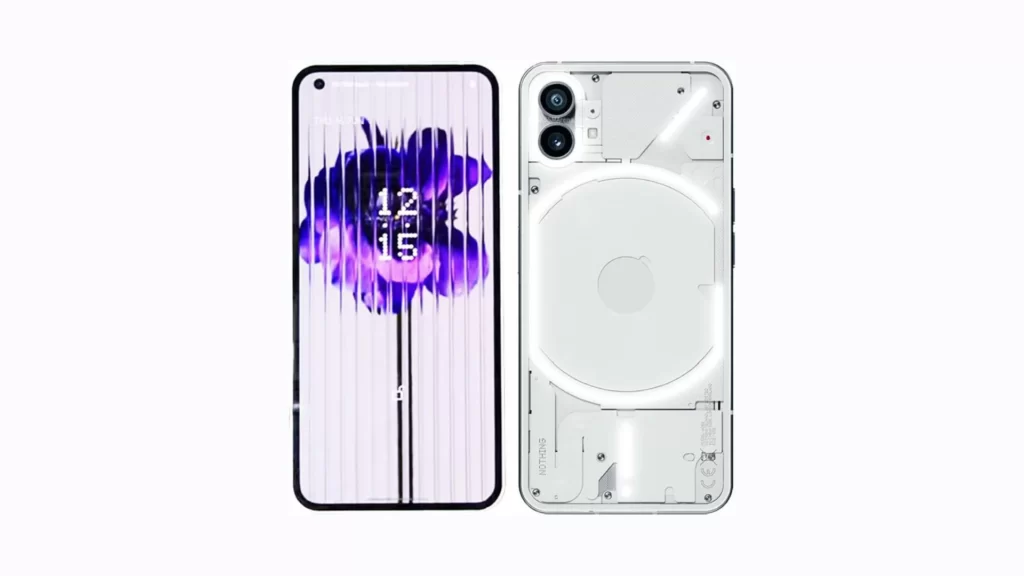
The Nothing 1 phone has a HDR10 OLED of 6, 55 inches offering a maximum luminosity of 700nits with a refreshment rate of 120 Hz. This screen benefits from a 1080 x 2400 pixels resolution to 402ppp and protected by Corning Gorilla Glass 5.
Xiaomi 13 comes with an OLED screen of 6,36 inches which benefits from a 1080 x 2400 pixels resolution to 414 ppp. This HDR10 + offers a maximal luminosity of 1900nits and a 120Hz refreshment rate. The Xiaomi 13 equally supports the Dolby Vision.
The screens on both devices offer same resolution and equivalent refreshment rates. However, the Phone 1 screen is slightly bigger than that of Xiaomi 13.
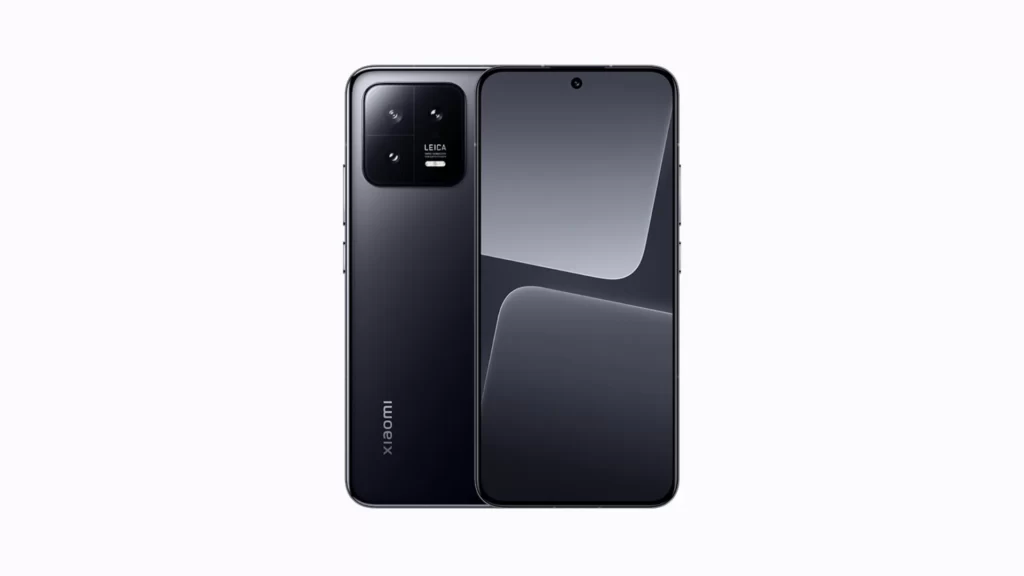
Xiaomi 13 on the other hand comes with more lighted display than that of its opponent. In terms of display, it is clear that Xiaomi 13 will be best than Nothing Phone 1. Shall it be the same for performance?
Dual Performance

Phone 1 is delivered with a snapdragon 778G+ chipset accompanied by a GPU Adreno 642L. In terms of memory, it is available in 8Go /128 Go, 8 Go/ 256 Go and 12 Go / 256 Go.
It supports the UFS 3.1 memory technology and does not have a Micro SD slot. Talking about the software, this device comes with an Android 12 system coupled with a Nothing OS interface.
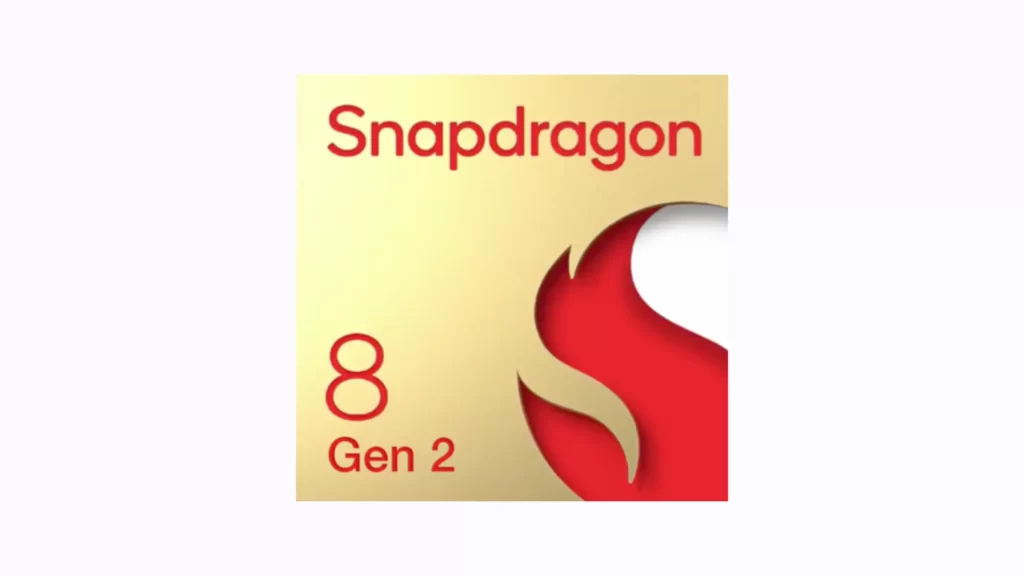
The Xiaomi 13 device shelters a Soc Qualcomm Snapdragon 8 Gen 2 accompanied by a GPU Adreno 740. As for what concerns the memories, the Xiaomi telephone is available in 8Go RAM/128 Go, 8Go RAM / 256 Go, 12 Go RAM/ 256 Go and 12 Go RAM/ 512 Go.
The 128 Go model supports the UFS 3.1 while the 256 or 512 settings of internal storage supports the UFS. 4.0 technology. Software, the Xiaomi device is equipped by an Android 13 system with MIUI 14 interface.
The snapdragon 8 Gen 2 chipset is better than the snapdragon 778G+
Additionally, Xiaomi has a better option in terms of memory with a memory technology and a recent Android system. Xiaomi 13 is therefore more powerful than Nothing Phone 1. Let us analyze cameras now.
Xiaomi 13 camera vs Nothing Phone 1

The Phone 1 of is equipped with a double camera system at the back made up of two captures of 50MP each. Its panel on the other hand shelters a 16MP frontal camera for selfies.
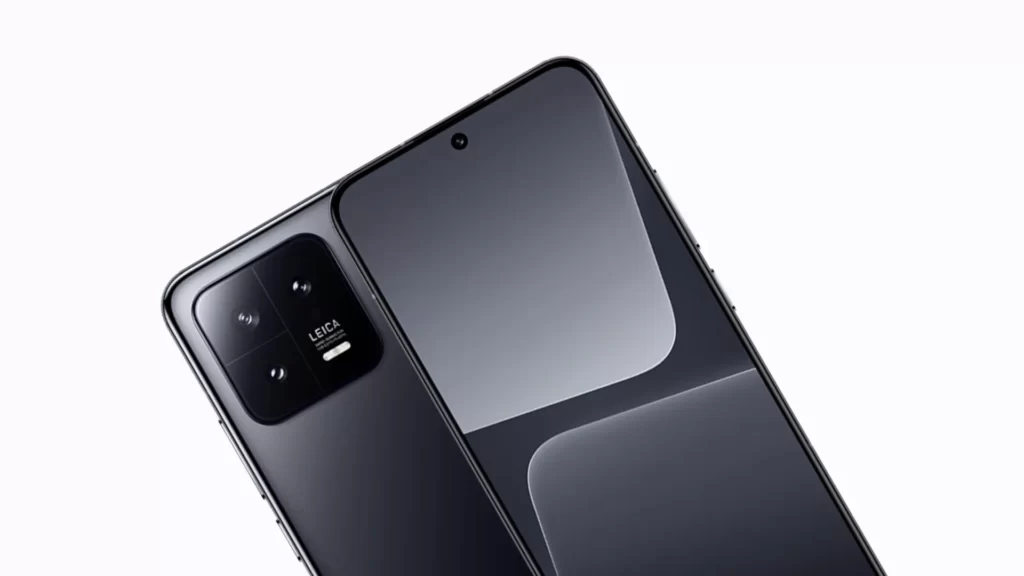
The back panel on Xiaomi 13 shelters a principal 50MP camera coupled with an ultra-great angle capture of 12 MP and a telephoto lens of 10MP. For selfies, this device comes with a 32 MP frontal camera.
The two cameras of both devices have been tested on Nano review. The Xiaomi 13 differentiated itself with a Score Nano review of 82 points against 66points for the cinema score of Phone 1. If we trust these tests, them the smartphone will snap better than Nothing. Finally, let us compare the batteries.
Battery and Charge
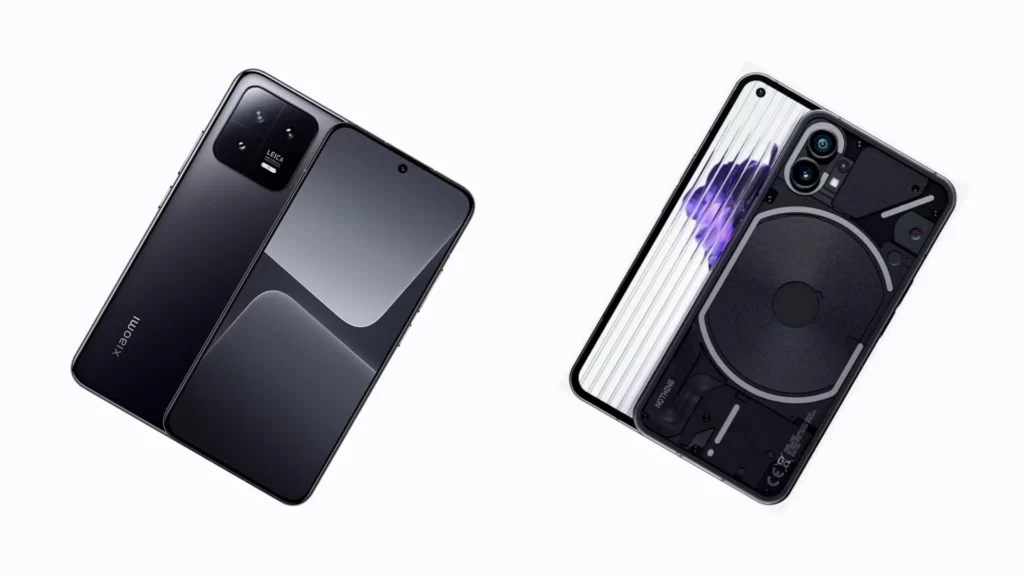
Phone 1 is powered by a non-removable battery Li-Po of 4500mAh. It supports a continuous rapid charge of 33W, which provides 50% recharge in 30minutes and 100%in 70minutes. It is also compatible with a wireless reverse charge of 5W.
Xiaomi 13 bags a Li-Po non-removable battery of 4500mAh and supports a rapid continuous charge of 67W (100% in 38 minutes), a wireless recharge of 50W (100% in 48minutes) as a wireless reverse charge of 10W.
The batteries of both smartphones offer same capacity. However, Xiaomi 13 has an upper hand because it supports the continuous charge and is wirelessly faster.
Price and release date
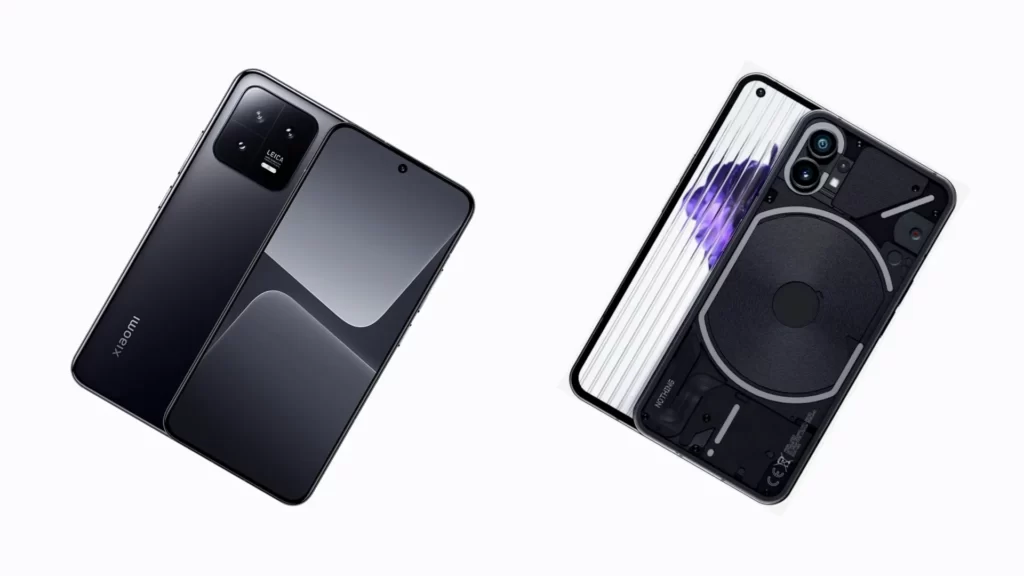
Nothing Phone 1 was officially presented on the 12 July 2022 during a London conference. It is already available in France and these are the prices on Amazon France website:
- 8 Go / 128 Go : 469,99 € (currently on promotion at 399,99 €)
- 8 Go / 256 Go: 499.00 €
- 12 Go / 256 Go: 549,00 €
Xiaomi 13 was officially launched in China on the 11 December 2022. It is not available in France yet. These are the official prices from the manufacturer’s website:
- 8 Go / 128 Go (black color) : 3 999 ¥ (539 € HT)
- 8 Go / 256 Go (black,white, vert, blue) : 4 299 ¥ (580 € HT)
- 12 Go / 256 Go (black, white, vert, blue) : 4 599 ¥ (620 € HT)
- 12 Go / 512 Go (black, white , vert, blue) : 4 999 ¥ (674 € HT )
Verdict Xiaomi 13 against Nothing Phone 1
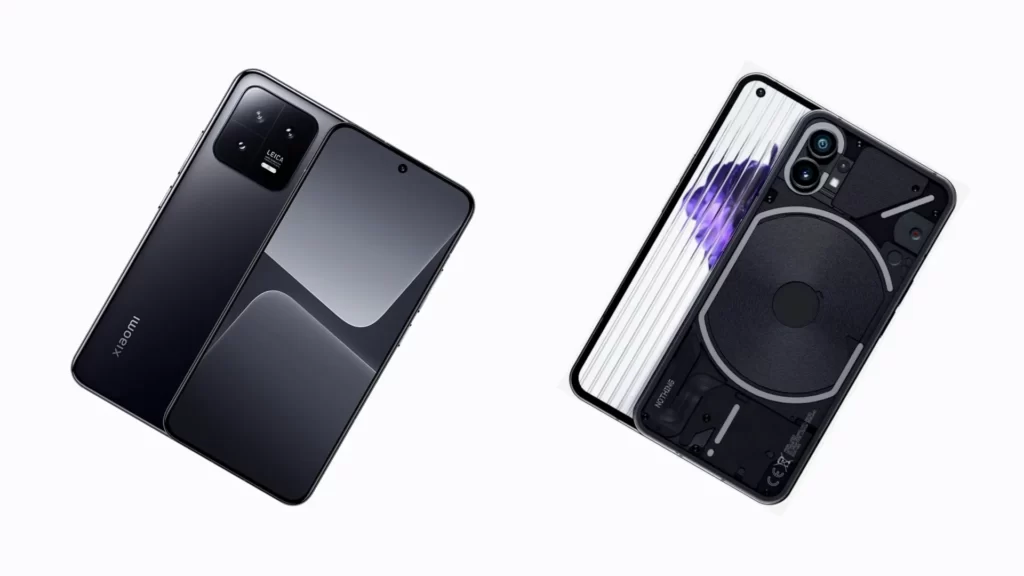
In conclusion, Xiaomi 13 is better than Nothing phone on all perspectives that we have analyzed namely the resistance to water and dust, display, performance, camera, battery and recharge. As for what concerns the design, this will depend on your taste and preference.
Talking about the price, Xiaomi 13 has a higher rank than Nothing Phone 1. However, if we were to make a choice between these two, we will advise that you to go for the Xiaomi 13 phone. One of its limits will be the availability in your residential region.
See also :
- Between Xiaomi 13 Pro and IQOO 11 Pro :which one should i choose?
- Xiaomi 13 Pro or iPhone 14 Pro : which one should I choose ?
